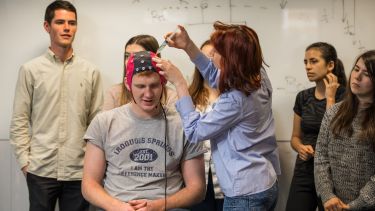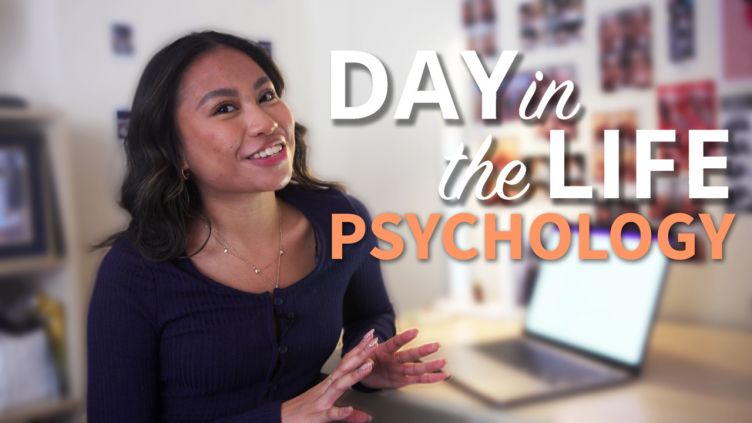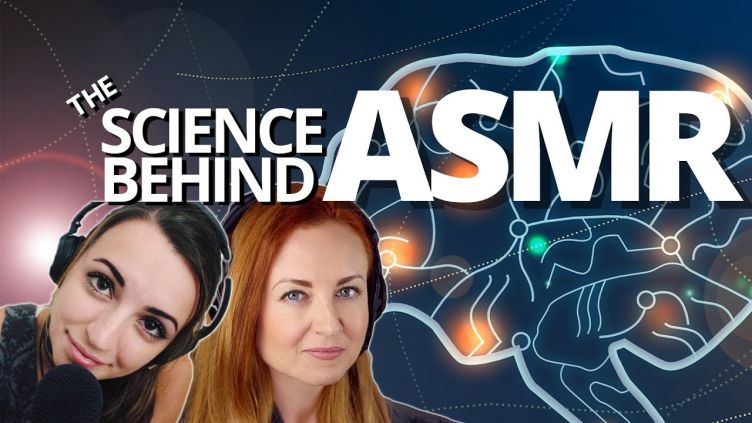Psychology with Placement Year BSc
2025-26 entryCover the breadth of psychology and apply your knowledge and skills with a year-long work placement. Study topics from social, health and clinical psychology, to cognitive and developmental psychology, neuroscience, and psychological research methods.
Key details
- A Levels AAB
Other entry requirements - UCAS code C803
- 4 years / Full-time
- September start
- Accredited
- Find out the course fee
- Industry placement
Explore this course:
Course description

Gain both the skills and the first-hand experience to understand human behaviour and investigate the workings of the mind.
Sheffield’s four-year BSc in Psychology with Placement Year covers five core areas, giving you a comprehensive understanding of the subject:
- Social and health psychology
- Neuroscience and clinical psychology
- Cognitive psychology
- Developmental psychology
- Research methods
Within these five areas you'll get the chance to explore important topics with real world relevance, such as addictions, eating disorders and depression. You'll run your own experiments and learn from some of the UK’s top psychology researchers, too.
In the first year of your degree, you'll study fundamental psychology topics, including how memory works, how we interact with others and our environment, and the biology behind human behaviour. In second year, you go even deeper into these core subjects. For example, you’ll learn about eating disorders, how children learn, and why people struggle to follow through with their intentions.
Advanced research methods run through this course like a spine. By the end of year two you’ll know how to use professional statistical analysis software, and how to take ethical considerations into account when designing research projects.
In your third year, you’ll have a wide range of modules to choose from. Whether it's criminal psychology, the psychology of sleep, clinical psychology, or the psychology of eating behaviour and weight management, you can focus on what interests you the most.
You'll also complete an in-depth research project on a topic you've chosen, with access to state-of-the-art psychology research facilities and tools like EEG, eye tracking, or virtual reality. You could even choose to undertake a six-week part-time work placement, making a real contribution to a local community partner.
A placement is a great opportunity to test out a career path that you're considering, whether that's within the field of psychology or applying your transferable skills in industry. Our students have previously completed their placements with organisations including the NHS, Prison and Probation Services and IBM. You'll pay reduced fees for the year you're on placement and you'll have the support you need from your tutor and the University.
Why study this course?
- British Psychological Society (BPS) accredited course - BPS accreditation makes you eligible for graduate membership – the first step to becoming a chartered psychologist, and necessary for courses in clinical, health and occupational psychology.
- Learn from leading researchers - with 92% of our research rated as world-leading or internationally excellent, studying psychology at Sheffield means you’ll be taught by leading researchers in the field.
- UK’s number 1 Students' Union - as voted for by students, for the last six years running.
This course is accredited by the British Psychological Society (BPS) and makes you eligible for graduate membership. This is the first step to becoming a chartered psychologist. It's necessary for courses in clinical, health and occupational psychology.

Modules
A selection of modules are available each year - some examples are below. There may be changes before you start your course. From May of the year of entry, formal programme regulations will be available in our Programme Regulations Finder.
Choose a year to see modules for a level of study:
UCAS code: C803
Years: 2022, 2023
In the first year of your degree, you'll study fundamental psychology topics, including how memory works, how we interact with others and our environment, and the biology behind human behaviour. You’ll take modules across the breadth of psychology ranging from developmental psychology and social psychology, to cognitive psychology, neuroscience and clinical psychology. Through your training in psychological research methodology you’ll also be learning how psychological experiments are designed and conducted, and get experience of how to analyse data and present findings.
Core modules:
- Social Psychology I
-
This module will provide an overview of the fundamentals of social psychology. The module will introduce and explain key theories and research, and their application, for understanding social psychological phenomena. Content is organised around two themes: How people think, and how people feel and behave. The module will include lectures that will provide opportunities to learn how to critically evaluate social psychological research and theories, as well as to describe how social psychology theory can be applied to address real world issues.
20 credits - Cognitive Psychology I
-
This unit provides an overview of core components of cognition, and principles of their investigation. The module covers perception, attention, performance, cognitive neuroscience, language, learning, memory and reasoning. It introduces and explores key concepts, theoretical perspectives and foundational methods. Examples of key studies in cognitive psychology will be considered critically.
20 credits - Neuroscience and Clinical Psychology I
-
This unit aims to provide students with an understanding of the key principles within neuroscience and clinical psychology. The module will introduce students to the basic structure and function of the brain, techniques and assessments used within neuroscience and clinical psychology, and an awareness of the ethical issues. The module will cover the aetiology, development, assessment and treatment of specific psychological and neurological disorders. Students will develop their knowledge, skills and understanding by attending lectures, engaging with activities/discussions within the lectures and engaging with the reading for this module.
20 credits - Developmental Psychology I
-
This module provides an overview of the fundamentals of Developmental Psychology from infancy to adolescence, and into later life. The module introduces concepts of development, including cognitive development, social development, and neurological development. It summarises major developmental changes, and discusses theoretical perspectives underlying developmental research. Examples of key studies in developmental psychology will be considered critically.
20 credits - Psychological Research Methodology I
-
This module provides an introduction to the knowledge and skills that underpin the science of psychology. We consider why psychological scientists conduct empirical research the way they do, and how to conduct research in psychological science. Topics span the various stages of the research process, including the logic of hypothesis testing; types of research designs, methodologies, and measurement strategies; descriptive statistics; simple qualitative and quantitative analytic techniques; and critical thinking about published research. Students will develop their knowledge and skills by attending lectures and participating in activities and discussions in workshops and tutorials.
20 credits
Students will also be able to take 20 credits of optional modules.
In second year, you'll build on your first year studies and explore core psychological topics in greater depth. For example, you’ll learn about eating disorders, how children learn, and why people struggle to follow through with their intentions. You'll gain more advanced research methods skills this year too as you learn how to use professional statistical analysis software, and take ethical considerations into account when designing research projects.
Core modules:
- Social Psychology II
-
The module continues from the linked first year social psychology module, Social Psychology 1 to cover specific social psychological topics in greater detail and depth. Lectures cover key theories and empirical research in social psychology. Lecture activities provide opportunities for applying social psychological theory and empirical research to explain or solve real world issues.
20 credits - Cognitive Psychology II
-
This unit builds on the overview of core components of cognition established at level 1 (Cognitive Psychology I). The module covers the same broad topics as Cognitive Psychology II - perception, attention, performance, cognitive neuroscience, language, learning, memory and reasoning. It expands on key concepts and introduced additional details of experimental methods and theoretical nuance. Applications of fundamental science are discussed.
20 credits - Neuroscience and Clinical Psychology II
-
This unit will build on the content of Neuroscience and Clinical Psychology I, to provide students with a more in depth understanding of principles within neuroscience and clinical psychology. The module will cover the aetiology, development, assessment and treatment of more complex psychological and neurological disorders. Students will develop and build on their knowledge, skills and understanding by attending lectures, engaging with activities/discussions within the lectures and engaging with the reading for this module.
20 credits - Developmental Psychology II
-
This module provides an in depth understanding of development from infancy to later life. The module builds on the overview of Developmental Psychology established at level 1 (Developmental Psychology I). The module examines how cognition, language, perception, and social skills develop, as well as considering individual differences in development and developmental disorders. It summarises major developmental changes, and discusses theoretical perspectives underlying developmental research. Examples of key studies in developmental psychology will be considered critically.
20 credits - Psychological Research Methodology II
-
This module builds on knowledge and skills developed at Level 1 to introduce more advanced concepts and techniques in research methods and statistics. Topics including research ethics; scale development; questionnaire design; advanced qualitative and quantitative analytic techniques; and critical thinking about published research. Students will develop their knowledge and skills by attending lectures and participating in activities anddiscussions in workshops and tutorials.
20 credits
Students will also be able to take 20 credits of optional modules.
You'll spend your third year on a work placement, testing out a career path and gaining valuable skills and experience to make you stand out from the crowd. Previous students have found placements with organisations including the NHS, Prison and Probation Services and IBM in roles including Assistant Psychologist and HR Business Development.
In your final year, you’ll have a wide range of modules to choose from. Whether it's criminal psychology, the psychology of sleep, clinical psychology, or the psychology of eating behaviour and weight management, you can focus on the areas within psychology that interest you the most, to support your career goals.
This year offers you another opportunity to put the skills you’ve learnt so far into practice. You'll complete an in-depth research project on a topic you've chosen with access to state-of-the-art psychology research facilities and tools like EEG, eye tracking, or virtual reality. You could even choose to undertake a six-week part-time work placement, making a real contribution to a local community partner.
Core modules:
- Extended Essay in Psychology
-
The extended essay is intended to give students an opportunity to study in some depth a topic of particular interest to them within the subject of Psychology. The topic must be approved by the supervisor. The essay will not entail the student conducting empirical research. Rather, it is intended to provide an opportunity for the student to write critically about a selected area in considerably more depth than is possible in a tutorial essay. The work is presented as a typed essay no longer than 3000 words not including abstract or references. Students will also write a short critical reflection on the resources they have used to write their essay. The reflection will form part of the assignment cover note submitted with the essay and will be no longer than 500 words.
20 credits - Research Project in Psychology
-
The research project is intended to give students an opportunity to investigate a topic in Psychology in depth, by empirical research or computational modelling over two semesters. The topic must be approved by the Level 3 Tutor and the Departmental Ethics Committee.Staff may offer ideas for research project work and/or students are encouraged to develop their own ideas. They are expected to carry out the research themselves, although assistance is given, as appropriate, with equipment, programming or other technical requirements. The completed project is presented as a typed dissertation. There is an 8000 word limit.
40 credits
Optional modules:
A student will take a minimum of 40 and a maximum of 60 credits from this group.
- Understanding and Evaluating Psychological Research: Real-world implications.
-
What is this module about?
10 credits
If you would like to improve your ability to understand and critically evaluate the strengths and weaknesses of psychology research papers, this module is for you. This module will:1) Provide a clear framework to read and evaluate psychology research papers critically2) Provide direct experience practising critical evaluation in a supportive tutorial environment3) Help you better understand and evaluate the real-world implications of scientific literature
Who is this module for?The module aims to make critical evaluation of research papers accessible and interesting for all students - including those who have found it challenging or confusing during Levels 1 and 2. The module will be useful for students interested in applying psychological research to solving real-world problems, science communication, or pursuing further study and research. - Cognitive Neuroscience
-
This unit provides an overview of the field of cognitive neuroscience, which is aimed at the understanding of the neural mechanisms involved in cognitive processes. Teaching will focus on methods and techniques, and the way in which these techniques have been used to help us understand aspects of cognition. Focus will be on perception, attention, and the neural underpinnings of certain neurodevelopmental conditions such as autism spectrum conditions and ADHD. In addition, we will discuss Brain Computer Interfaces and consider practical ways in which cognitive neuroscience techniques are being used in assistive healthcare. A strong focus of the course will be in understanding the way in which EEG is used in Psychology research. The course will include a practical demonstration of EEG and workshops focused on analysing EEG data.
10 credits - Conditions affecting cognition and behaviour across the lifespan
-
This unit investigates the causes and consequences of conditions affecting cognition and behaviour across the lifespan. It specifically focuses on neurodevelopmental conditions and stroke. For each topic (i.e. for each neurodevelopmental condition covered and for each type of stroke), diagnosis, cognition and behaviour will be discussed. Each condition will also be set in context, explaining the support which may be required, including family support and intervention strategies.
10 credits - Cognitive Behavioural Therapy for Eating Disorders
-
The broad aim of this module is to introduce students to the link between academic evidence and clinical practice when delivering evidence-based psychotherapies. The more specific aim is to introduce principles and practice of cognitive behavioural therapy, as applied to the treatment of eating disorders, linking evidence and practice explicitly. The module will commence with an introduction to cognitive-behavioural models of eating disorders. It will then address the evidence that supports those models and the effectiveness of the therapy overall. Subsequent lectures will introduce and demonstrate therapist skills and impact on patients (e.g., formulation; cognitive restructuring; behavioural experiments; exposure; psychoeducation).
10 credits - Criminal Psychology
-
This module will introduce students to the psychological aspects of criminal behaviour. Developmental, social, biological, and genetic perspectives on the origins criminal behaviour will be considered. Different types of crimes, including homicide, crimes against children, crimes committed by gangs, and sexual and intimate partner violence, will be introduced and research in those areas will be critically evaluated. Following lectures, students will engage in independent study to critically evaluate causes of crime and to compare and contrast relevant preventions, using a self-selected case study. The module focuses on important aspects of criminal psychology. No prior knowledge of criminal psychology is assumed.
10 credits - The neuroscience of learning and memory
-
The aim of the course is to explain current research, both experimental and theoretical, into the brain mechanisms that underlie basic forms of reward processing, associative learning and the formation of episodic memories. The lectures first cover the neural responses to pleasurable stimuli, including drugs of abuse. Next, the main characteristics of classical conditioning are outlined, followed by an account of cerebellar anatomy and physiology: a necessary basis for the evaluation of models of cerebellar function as applied to classical conditioning. Then, the anatomy and physiology of the hippocampus and its involvement in learning and memory will be described. Focus will be on episodic memory and how neural coding in the hippocampus might be used to store and recall memories.
10 credits - Occupational Psychology
-
To introduce and explore psychological issues in work settings, examining people's behaviour, thoughts and feelings related to their work. The course also focuses on some key organisational practices and processes, such as training and development, and leadership.
10 credits - Psychology of eating behaviour and weight management
-
This module will cover key theories and empirical research on the psychology of eating behaviours and weight management. We will consider the main drivers of eating behaviours and strategies to reduce overconsumption, as well as considering effective strategies for weight loss and weight loss maintenance. Throughout the course, we will consider why some individuals are more susceptible to overconsumption and weight gain compared to others. We will also cover the stigma that people with obesity experience and consider stigma-reducing strategies. You will learn about the methods used and the challenges faced by researchers in this area. You will also have the opportunity to apply your learning to inform interventions and/or programmes to promote successful weight management and/or reduce weight stigma. The module will be delivered via lectures.
10 credits - How children learn to use language for social communication
-
How do children learn to use language with other people? This is the question addressed by research on pragmatic development. This module will start with some theoretical background on the nature of human language and the definition of pragmatics. It will then introduce you to the series of pragmatic skills acquired during infancy, childhood and adolescence (from prelinguistic communication right up to sarcasm and story-telling). We will finish up by considering individual differences in pragmatic development and atypical developmental trajectories. Throughout the course, we will highlight the research methods used to test pragmatic skills, the learning mechanisms that drive developmental change and the real world applications in computational, educational and clinical domains. The module will be delivered via lectures.
10 credits - Using Behavioural Science to tackle Sustainability Challenges
-
Human behaviour is one of the biggest contributors to climate change, loss of biodiversity, and deforestation. As such, understanding behaviour, and learning how to change it, has the potential to have a significant impact on these issues. This module will provide students with an understanding of how theories and methods used in the behavioural sciences are being used to tackle real-world environmental challenges. Students will use theoretical models of behaviour (e.g., Theory of Planned Behaviour, COM-B) and previous research to understand the barriers and enablers of pro-environmental attitudes and behaviour. Students will also evaluate a range of lab- and field-based interventions designed to promote pro-environmental behaviour (e.g., via incentives, fines, and persuasive technologies) and will consider the impact that environmental challenges have on our health and wellbeing (e.g., in the case of eco-anxiety and climate grief).
10 credits
Through lectures and activity-led workshops students will gain skills in designing and evaluating behaviour change interventions and disseminating research to relevant stakeholders (e.g., by responding to government consultations). This module will also provide students with an overview of the innovative sustainability research taking place within the Department of Psychology here at Sheffield and will demonstrate how psychologists can (and should) collaborate with scientists from other disciplines to avoid unintended negative consequences (i.e., an outcome of an intervention that was not expected, but had a negative impact on the environment) and develop interdisciplinary solutions. - Offending Behaviour: Rehabilitation and Resettlement
-
This module will introduce various concepts related to the field of Forensic Psychology, specifically considering what happens after a person has been convicted of a criminal offence. You will learn about different factors that contribute to the rehabilitation and resettlement of people with various conviction types. Example topics might include: post-conviction living environments, offending behaviour treatments, risk considerations, resettlement issues, and desistance from crime. You will learn about these issues for people with various different offence types. The module aims to develop your understanding of topics that are central to reducing reoffending, and aiding people with convictions to live positive, offence-free, lives.
10 credits - Coding for psychologists
-
Managing large datasets is increasingly seen as a key skill by employers both inside and outside of academia. Best practice in this area often borrows from fields such as data engineering, where the ability to write code and understand programming principles is crucial. Students who complete this module will gain an understanding of these principles, and will learn the fundamentals of how to code using R, an approachable open source coding language commonly used in psychology, data science engineering, and bioinformatics.
10 credits
This module provides an introduction to processing and managing data sets with R, with a focus on processing data from psychological research. After collecting the data, both students and researchers can be overwhelmed by the huge amount of data and different files and are at risk to get lost in the many steps of preprocessing and analyses. In this module, students will learn how to organise and prepare data for the next steps of analyses. The module will teach fundamental coding principles, and cover how to develop routines for checking the plausibility and quality of data. By the end of the module, students will have acquired the knowledge to write a set of scripts and routines to preprocess empirical data sets from psychological research. - Psychology in the Community and in the Workplace
-
The aim of this
20 credits
module is to provide students with the opportunity to apply their learning from
the first 2 years of their Psychology degree by undertaking a six-week
part-time placement that would be completed alongside their other third year
modules. Students will work alongside local community partners to complete
project work that will make a tangible contribution to an organisation, local
community, or specific service user groups. This module will enable students to
see how a wide variety of professionals from different psychology, health,
education, social work, youth work and other backgrounds work together to
address the health and well-being of local communities. - Psychology of Sleep
-
The module provides an overview of the neural basis of sleep and the changes in the brain which occur during various stages of the sleep cycle. It will also cover the reasons why we sleep and the functions of sleep, with examples from Cognitive Psychology. In addition to this, some of the most common sleep disorders will be examined, including explanations regarding their underlying aetiology and current available treatments. This module is broad and will make references to different areas of Psychology, including elements of Neuroscience, Clinical, Cognitive and Health Psychology.
10 credits - Current Controversies in the Psychology of Addiction
-
This module will introduce students to controversial issues related to addiction from a psychological perspective. Topics will cover the nature of addiction, its determinants, underlying neurological basis, treatment, and prognosis. During each lecture, the controversial topic will be introduced before relevant evidence is described and critically evaluated. Clinicians and / or service users with direct experience of addiction may contribute to some of these sessions. Topics covered may vary from year to year as new controversies emerge, but are likely to include critical appraisals of the brain disease model of addiction, and the roles of compulsion and habit.
10 credits - Interventions and treatment in clinical psychology
-
This module aims to increase students' knowledge of clinical psychology in practice. It will familiarise students with a range of treatments and interventions used in clinical psychology and their effectiveness, with an emphasis on current research evidence (where available). The module will concentrate on how therapeutic interventions can be used to alleviate emotional distress and improve functioning in common and complex mental health conditions; along with considering the use of transdiagnostic models where appropriate.
20 credits
A student will take up to 20 credits from this group.
- What is Learning?
-
The module explores understandings about how people learn, and implications that these understandings have for how we conduct key social practices, including teaching, caring for children, assessing learning, and on educating generally. We will also look 'beneath' understandings of learning to the worldviews on which they stand, particularly 'realist' and 'constructivist' positions. This matters because 'realism' and 'constructivism' carry implications for how we conceptualise things we take for granted: the nature of truth, the process and products of science, the basis for ethics, the outcomes of research, and assumptions about what is. The module will explore these challenging issues.
20 credits - Philosophies of Education
-
This module will explore the importance of philosophy to the study of education. It covers key moments in the history of Western philosophy, focusing on the question of modernity (What is modernity? What are its ramifications for education?). The module will investigate the consequences of late modernity for present day education, a period in which the aims and purposes of education have become increasingly unclear, leaving education open to the rise of instrumentalism and the forces of capital. Overall the module offers a critique of common assumptions in education, provoking questioning about its nature and purposes.
20 credits - Psychoanalytic Perspectives of Infancy and Childhood
-
This module examines a variety of psychoanalytic theories of infant development from birth through infancy and early childhood. These theories include the classical psychoanalytic perspectives of Sigmund Freud, Melanie Klein, Donald Winnicott and Jacques Lacan. We also bring in the work of Frantz Fanon, Juliet Mitchell, Donald Winnicott, Herbert Marcuse, Gilles Deleuze and Félix Guattari to consider the ways in which the concepts and theories of psychoanalysis can be combined with the interests of feminism, anti-racist decolonisation, Marxism and queer theory. The module includes the consideration of the role of play, language and cognitive development on the child's developing understanding of the self and of family relationships. And we will explore the relationship between the psyche, culture and society. There will also be a critical analysis of the methodology that underpins the knowledge presented and students will be encouraged to critically examine the knowledge claims made by the various theories and theorists presented to you throughout the module.
20 credits - Community, Music and Education
-
This module will engage you in the current debates and practices of music in education and community settings, from the formal classroom setting and instrumental studio, through the work done by community support groups, to more recreational musical practice in the community. Questions of music's place in the curriculum, the relationship between school and home music, and the challenges of providing a vibrant musical education for all people, will be addressed in lectures and discussions.
20 credits
You will work in mentored groups to investigate and support community music-making or school-based music education in Sheffield, building your skills as a researcher, and learning about career options including teaching, delivering and managing music provision for young people and vulnerable adults. You will finish the module knowing more about music and its contribution to education and society, through your critical reflection on published research evidence, and through school and community fieldwork visits. - Topics in Social Philosophy
-
This module will introduce students to some contemporary issues in social philosophy.
20 credits - Children, Families and Welfare States
-
This module examines welfare state support and services for children, parents and families, informed by sociological and social policy theories, concepts and research. Adopting a comparative approach, the module critically reviews different approaches to, and configurations of, welfare state support and services for children, parents and families across the UK and Western/Northern European welfare states. Four policy and provision domains are examined, namely cash support for children and families; childcare and early years' services; parental leave and work-family balance policies; and child welfare and family support services.
20 credits - Sensory Neuroscience
-
This module covers the adult function and functional development of the auditory system, including sensory transduction and information processing. It will focus primarily on the periphery but will include representation of information in central pathways, with attention to mammalian animal models. The aims will be to show how physiological and developmental mechanisms combine to create the exquisite structural and functional tuning of the auditory system to the external world and how complex sensory information is encoded in the nervous system.
10 credits - Education@Sheffield
-
In Education@Sheffield students are invited to explore and evaluate the rich and diverse research taking place within the School of Education. Through a series of seminars presented by active researchers, students are encouraged to critically engage with research - and the researchers themselves - in the fields of educational and childhood studies. The Education@Sheffield module enables students to acquire a critical understanding of various themes, settings and methodologies which shape contemporary educational research.
20 credits - Globalising Education
-
This module considers the extent to which education might be viewed as a global context with a shared meaning. Moving outwards from the dominant concepts, principles and practices which frame 'our own' national, or regional responses to education, the module explores other possible ways of understanding difference. By examining 'other ways of seeing difference', in unfamiliar contexts, students are able to examine the implications of globalisation for education and explore the opportunities and obstacles for the social justice agendas within a range of cultural settings.
20 credits - Biological Basis of Brain Disease 1: Neurodegeneration
-
The module will examine recent and current research into human neurodegenerative disease including Huntington's, Parkinson's, Alzheimer's and motor neuron disease. In addition, reference may be made to the spongiform encephalopathies, frontal dementias and Lewy body disease, with emphasis on their inter-relationships and commonalities. The genetic and non-genetic aetiological influences, defining pathology and pathophysiology and current understanding of the underlying biology will be examined by a detailed consideration of current research in these areas. The module will also include discussion of the prevention and treatment of the diseases, highlighting possible therapies which may be useful in several pathologies.
10 credits - Music Psychology in Everyday Life
-
This module will introduce you to theories, empirical investigations and applications of music psychology relevant to everyday life. You will learn about the diverse uses of music in everyday situations, which may include personal, communal and commercial settings. The reasons for music use in these situations are explored and possible explanations of music's ability to support functions are critically reviewed, including social, emotional, personal, educational and commercial impacts. The module will be delivered through lectures, group discussions, and small research projects.
20 credits - Philosophy of Psychology
-
This course provides an in-depth look at a selection of issues in contemporary philosophy of psychology. Philosophy of psychology is concerned with such questions as : What is the structure and organisation of the human mind? Is the mind one big homogenous thing, or is it made up of smaller interacting components? If it has components, what sort are they and how are they interrelated? What aspects of our minds are uniquely, or distinctively human? What is the cognitive basis for such capacities as our capacity for language, rationality, science, mathematics, cultural artefacts, altruism, cooperation, war, morality and art? To what extent are the concepts, rules, biases, and cognitive processes that we possess universal features of all human beings and to what extent are they culturally (or otherwise) variable? Do infants (non-human) animals, and individuals with cognitive deficits have minds, and if so, what are they like? To what extent are these capacities learned as opposed to innately given? How important is evolutionary theory to the study of the mind? What is the Self? What are concepts? Is all thought conceptual? Is all thought conscious? What is consciousness? This course will discuss a selection of these and related issues by looking at the work of philosophers, psychologists, and others working within the cognitive sciences more generally.
20 credits - Pain, Pleasure, and Emotions
-
Affective states like pain, pleasure, and emotions have a profound bearing on the meaning and quality of our lives. Chronic pain can be completely disabling, while insensitivity to pain can be fatal. Analogously, a life without pleasure looks like a life of boredom, but excessive pleasure seeking can disrupt decision-making. In this module, we will explore recent advances in the study of the affective mind, by considering theoretical work in the philosophy of mind as well as empirical research in affective cognitive science. These are some of the problems that we will explore: Why does pain feel bad? What is the relation between pleasure and happiness? Are emotions cognitive states? Are moral judgments based on emotions? Can we know what other people are feeling?
20 credits - Moral Theory and Moral Psychology
-
This course examines the relationship of moral theory and moral psychology. We discuss the relationship of science and ethics, examine the nature of self-interest, altruism, sympathy, the will, and moral intuitions, explore psychological arguments for and against familiar moral theories including utilitarianism, virtue ethics, deontology and relativism, and confront the proposal that understanding the origins of moral thought 'debunks' the authority of ethics. In doing so, we will engage with readings from historical philosophers, including Hobbes, Butler, Hume, Smith, Kant, Mill, Nietzsche and Moore, as well as contemporary authors in philosophy and empirical psychology.
20 credits - What it means to be human
-
New technologies and new scientific knowledge make powerful claims about `human nature’ that are reconstructing how we understand ourselves. At the same time, they also give us new potential to reshape our bodies and brains. This module aims to critically engage with these developments using concepts from a number of sociological traditions. Can biology tell us anything meaningful about social interaction or racial and gendered differences, or about ability and disability? What are the criteria by which we determine ‘the human’ and who decides what these shall be? Does our psychology have an evolutionary basis? How are the boundaries between humans and machines changing? What is the human impact on the environment? Should we use new technologies to enhance ourselves? The module will provide students with the opportunities and tools to grapple with these and other important questions.
20 credits - Global Health Challenges
-
The module builds on the study undertaken in year one and two of the programme (NURU 146) and will explore the challenges facing health in the 21st century in greater depth. Topics covered will include: commissioning and the potential risks to service delivery, the personalisation and self directed support agenda, persisting health inequalities, economic pressures, management of scarce resources, demographic challenges, health promotion strategy in hard to reach groups, the need for evidence based interventions and their cost implications, consumerism and the market in health care.
20 credits
Students can also select Languages for All modules. For details please see www.sheffield.ac.uk/languages-for-all/choose-language
The content of our courses is reviewed annually to make sure it's up-to-date and relevant. Individual modules are occasionally updated or withdrawn. This is in response to discoveries through our world-leading research; funding changes; professional accreditation requirements; student or employer feedback; outcomes of reviews; and variations in staff or student numbers. In the event of any change we'll consult and inform students in good time and take reasonable steps to minimise disruption.
Learning and assessment
We use a range of teaching methods to make sure that you get the skills and knowledge that every psychologist needs. You'll learn through lectures, small group tutorials and workshops, practical sessions and research projects.
Assessment
Throughout the course, you'll be assessed through a variety of methods including exams, tests and coursework.
Programme specification
This tells you the aims and learning outcomes of this course and how these will be achieved and assessed.
Entry requirements
With Access Sheffield, you could qualify for additional consideration or an alternative offer - find out if you're eligible.
The A Level entry requirements for this course are:
AAB
including a science subject
- A Levels + a fourth Level 3 qualification
- ABB including a science subject + B in a relevant EPQ (relevant EPQ topics include the fields of Psychology and Biology); ABB including a science subject + A in Core Maths
- International Baccalaureate
- 34 with 5 in a Higher Level science subject
- BTEC Extended Diploma
- DDD in Applied Human Biology, Applied Psychology, Applied Science or Medical Science
- BTEC Diploma
- DD in Applied Human Biology, Applied Psychology, Applied Science or Medical Science + A at A Level; DD + A in an A Level science subject
- T Level
- Distinction in the Health, Healthcare Science or Science T Level, including grade A in the core component
- Scottish Highers + 1 Advanced Higher
- AAABB + B in a science subject
- Welsh Baccalaureate + 2 A Levels
- B + AA including a science subject
- Access to HE Diploma
- Award of Access to HE Diploma in Science, with 45 credits at Level 3, including 36 at Distinction and 9 at Merit
-
Science subjects include Biology/Human Biology, Chemistry, Environmental Science, Maths, Further Maths, Physics, Psychology, or Statistics
-
GCSE Maths grade 6/B
The A Level entry requirements for this course are:
ABB
including a science subject
- A Levels + a fourth Level 3 qualification
- ABB including a science subject + B in a relevant EPQ (relevant EPQ topics include the fields of Psychology and Biology); ABB including a science subject + A in Core Maths
- International Baccalaureate
- 33 with 5 in a Higher Level science subject
- BTEC Extended Diploma
- DDD in Applied Human Biology, Applied Psychology, Applied Science or Medical Science
- BTEC Diploma
- DD in Applied Human Biology, Applied Psychology, Applied Science or Medical Science + B at A Level; DD + B in an A Level science subject
- T Level
- Distinction in the Health, Healthcare Science or Science T Level, including grade A in the core component
- Scottish Highers + 1 Advanced Higher
- AABBB + B in a science subject
- Welsh Baccalaureate + 2 A Levels
- B + AB including a science subject
- Access to HE Diploma
- Award of Access to HE Diploma in Science, with 45 credits at Level 3, including 30 at Distinction and 15 at Merit
-
Science subjects include Biology/Human Biology, Chemistry, Environmental Science, Maths, Further Maths, Physics, Psychology, or Statistics
-
GCSE Maths grade 6/B
You must demonstrate that your English is good enough for you to successfully complete your course. For this course we require: GCSE English Language at grade 4/C; IELTS grade of 6.5 with a minimum of 6.0 in each component; or an alternative acceptable English language qualification
Equivalent English language qualifications
Visa and immigration requirements
Other qualifications | UK and EU/international
If you have any questions about entry requirements, please contact the department.
Graduate careers
Department of Psychology
A psychology degree will put you in an excellent position for many jobs in the private or public sector. Many of our graduates go on to be Clinical Psychologists, IAPT practitioners or train in the NHS.
Our degree is accredited by the British Psychological Society, and covers all the topics and training that you need to complete the first steps towards becoming a Chartered Psychologist.
Our graduates work in human resources, market research, advertising, sales, social work, nursing and teaching. They also enter professions such as clinical, health or occupational psychology, usually after postgraduate training. Some of our graduates continue to a PhD to follow a psychology research career.
Department of Psychology

Our teaching is informed by cutting-edge scientific research, which ranges from neuroscience through to child development and understanding why psychological therapies are effective. All of this has an impact on wider society.
Our work explores health and wellbeing, lifestyle choices, cognitive behavioural therapy, safe driving, mother-baby interaction, autism, Parkinson's disease, and reducing prejudice and inequality.
Department of Psychology students are based at Cathedral Court in the heart of Sheffield city centre, where you'll find our state-of-the-art computer lab, seminar rooms, tutorial rooms and social space.
We're within easy walking distance of all of the main University of Sheffield facilities, including the Information Commons, the Diamond, and our award-winning Students' Union.
Facilities
We have a suite of newly-refurbished testing cubicles where you can use computer stimulus presentation software to run experiments as part of your own mini projects. You can access a range of tools for testing participants in your third year research project. This includes eye-tracking technology used in perception studies, our state-of-the-art EEG suite for measuring brain activity, biomimetic robots, motion capture equipment and a virtual reality suite.
Department of PsychologyWhy choose Sheffield?
The University of Sheffield
Number one in the Russell Group
National Student Survey 2023 (based on aggregate responses)
92 per cent of our research is rated as world-leading or internationally excellent
Research Excellence Framework 2021
Top 50 in the most international universities rankings
Times Higher Education World University Rankings 2023
Number one Students' Union in the UK
Whatuni Student Choice Awards 2023, 2022, 2020, 2019, 2018, 2017
Number one for teaching quality, Students' Union and clubs/societies
StudentCrowd 2023 University Awards
A top 20 university targeted by employers
The Graduate Market in 2023, High Fliers report
Department of Psychology
Research Excellence Framework 2021
Fees and funding
Fees
Additional costs
The annual fee for your course includes a number of items in addition to your tuition. If an item or activity is classed as a compulsory element for your course, it will normally be included in your tuition fee. There are also other costs which you may need to consider.
Funding your study
Depending on your circumstances, you may qualify for a bursary, scholarship or loan to help fund your study and enhance your learning experience.
Use our Student Funding Calculator to work out what you’re eligible for.
Work experience
Each year undergraduate students can apply to join the Sheffield Undergraduate Research Experience scheme. This gives you the chance to spend around six weeks working in one of our research groups over the summer. It's a unique opportunity to pursue research in an area that you’re excited about, and can help inform your future career aspirations.
Visit
University open days
We host five open days each year, usually in June, July, September, October and November. You can talk to staff and students, tour the campus and see inside the accommodation.
Subject tasters
If you’re considering your post-16 options, our interactive subject tasters are for you. There are a wide range of subjects to choose from and you can attend sessions online or on campus.
Offer holder days
If you've received an offer to study with us, we'll invite you to one of our offer holder days, which take place between February and April. These open days have a strong department focus and give you the chance to really explore student life here, even if you've visited us before.
Campus tours
Our weekly guided tours show you what Sheffield has to offer - both on campus and beyond. You can extend your visit with tours of our city, accommodation or sport facilities.
Apply
Contact us
- Telephone
- +44 114 222 6531
- psy-ug-admissions@sheffield.ac.uk
The awarding body for this course is the University of Sheffield.
Recognition of professional qualifications: from 1 January 2021, in order to have any UK professional qualifications recognised for work in an EU country across a number of regulated and other professions you need to apply to the host country for recognition. Read information from the UK government and the EU Regulated Professions Database.
Any supervisors and research areas listed are indicative and may change before the start of the course.







